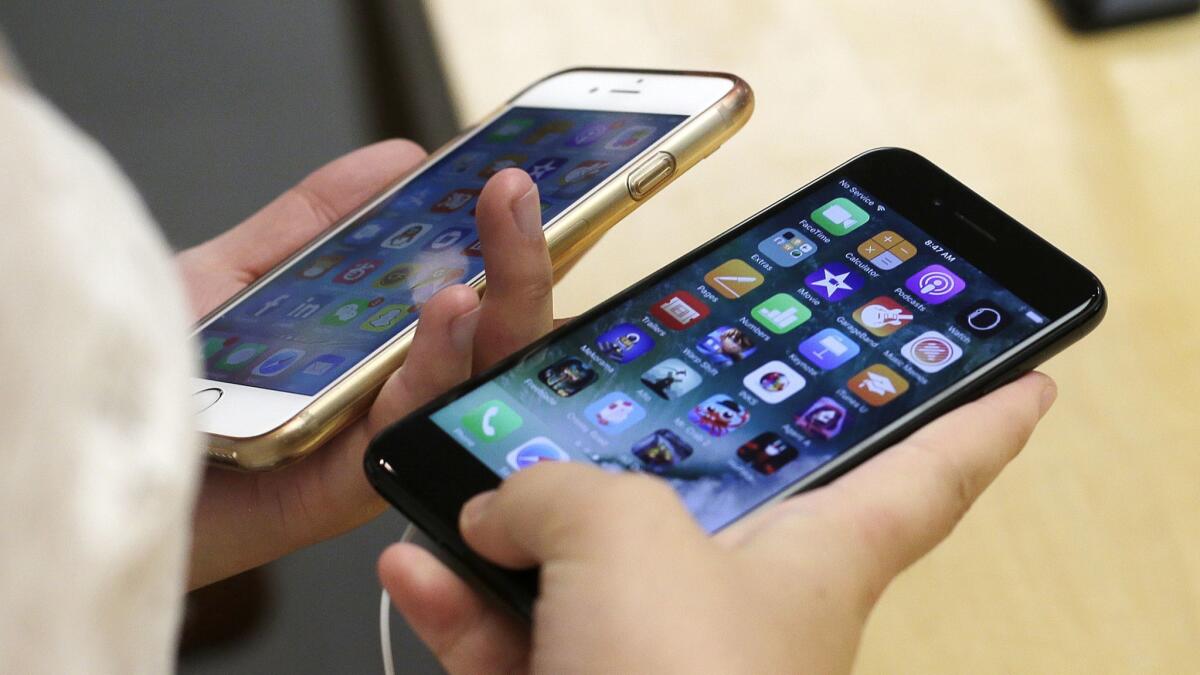Qualcomm puts value of its patents on the line as suit against Apple goes to trial

Qualcomm Inc. is putting the value of its patent portfolio on the line in a San Diego courtroom to try to make Apple Inc. pay for using technology the chipmaker credits for the iPhone’s commercial success.
It’s the first time a U.S. jury will have a say in the two-year, sprawling global battle between the tech giants. Qualcomm alleges that Apple infringed on patents related to technology for graphics processing and battery power conservation. The San Diego chipmaker says the patented tech improves the efficiency and reduces the cost of smartphones.
A major damages award by jurors would help Qualcomm undermine Apple’s claims that the chipmaker overcharges for its patent portfolio, and it may give Apple an incentive to negotiate a comprehensive settlement to their dispute. The trial started Monday in federal court in San Diego and is scheduled to take two weeks.
“Qualcomm could really use a win to bolster the view that its robust patent portfolio is entitled to protection,” said Bloomberg Intelligence analyst Tamlin Bason. But he added that because Qualcomm is unlikely to get a court order banning sales of infringing iPhone models, it may not gain much leverage against Apple if it wins the trial.
Even if it loses, Apple can shrug off virtually any damage award, Bason said, but a verdict for the iPhone maker would weaken Qualcomm’s hand.
“We have a dispute,” Qualcomm attorney David Nelson told the jury in his opening statement. “We can’t resolve it.”
According to court filings, Qualcomm seeks $1.41 per infringing iPhone sold in the United States since July 6, 2017, when it filed the lawsuit. Based on an estimated 91 million units Apple sold in the nation in its 2018 fiscal year, the damages could amount to as much as $223 million for iPhones sold through the end of this month.
Qualcomm has lost billions of dollars in revenue after Apple, through its Asian manufacturers, stopped paying patent royalties in 2017. The chipmaker had been the exclusive supplier of cellular chip sets for the iPhone for five years, but a “truce” between the companies unraveled in 2016 and Apple switched to Intel Inc. for the chips. Qualcomm has accused Apple of instigating regulatory actions against it around the world and of lying to government officials.
Their fallout has spawned dozens of court cases on three continents, with neither side scoring a decisive victory so far. In December, courts in China and Germany banned sales of some iPhone models after finding that Apple infringed Qualcomm patents, but neither injunction covers Apple’s most recent iPhone models.
Those decisions haven’t forced Apple to settle its numerous disputes with Qualcomm even as the Cupertino, Calif., company is facing slowing demand for its iconic phones. The chipmaker is also trying to get the U.S. International Trade Commission to ban imports of iPhones with infringing Intel chips, but a commission judge last year recommended against the request even though he agreed that one of Qualcomm’s patents in the case was infringed.
The two International Trade Commission cases — insofar as they theoretically still present a risk of an import ban for Apple — are among four cases that are most likely to produce a shift in the companies’ bargaining positions, Bason said. Another is a lawsuit Apple brought in January 2017 challenging Qualcomm’s licensing practices. That case is scheduled for trial next month, with billions of dollars in damages at stake.
The fourth crucial case is the U.S. Federal Trade Commission’s antitrust lawsuit against Qualcomm in San Jose that went to a nonjury trial in January. Qualcomm is awaiting a judge’s ruling on the agency’s allegations that the company illegally used its position as the biggest provider of chips used in smartphones to extract billions of dollars in licensing fees.
Apple and its manufacturers are unlikely to settle with Qualcomm until they know how the FTC case will affect Qualcomm’s licensing practices, according to Bason.
Qualcomm’s strategy in the patent trial that began Monday is to demonstrate that its technology has a much broader reach than Apple has argued.
Apple claims that Qualcomm uses its patents for basic mobile telecommunications functionality to demand royalties that far exceed the contribution the technology makes to Apple’s increasingly sophisticated products.
Qualcomm, which has 130,000 patents and patent applications, maintains that the whole industry benefits from its inventions beyond the standard-essential technology to connect to a telecom network. The company is using the patent litigation to try to prove that its other intellectual property contributes significantly to the iPhone.
“Qualcomm’s technologies enable the cellular ecosystem that allows smartphones to send and receive vast amounts of data and voice communications at rapid speeds, seamlessly and reliably, from anywhere within reach of a cellular network,” the chipmaker said in a 2017 court filing. “Qualcomm’s inventions are necessary for the entire cellular network to function, they are not limited to technologies in modem chip sets or even cellphones.”
More to Read
Inside the business of entertainment
The Wide Shot brings you news, analysis and insights on everything from streaming wars to production — and what it all means for the future.
You may occasionally receive promotional content from the Los Angeles Times.










